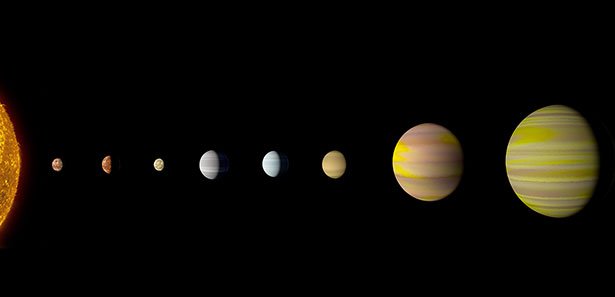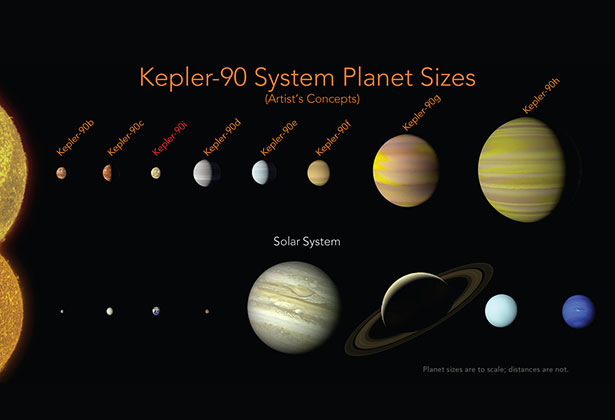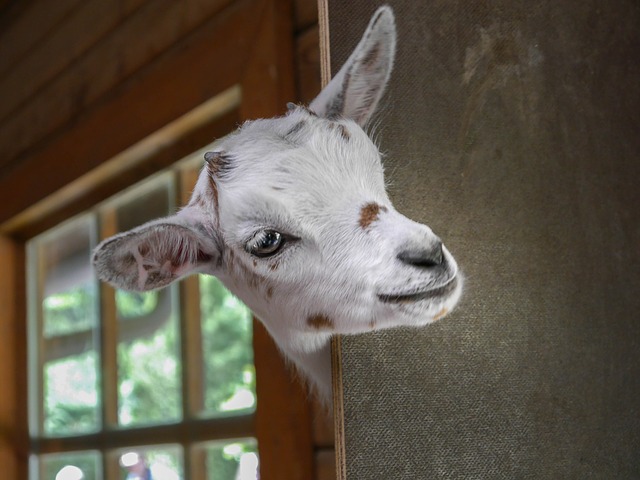AI discovers star with eight planets
Our solar system is no longer the only one with eight planets
Machinebrain as a planet hunter: Our sun is no longer the only known star with eight planets. Around the star Kepler-90, which is 2,545 light-years away, also eight companions. The eighth planet of this system was not discovered by a human astronomer, but by an adaptive artificial intelligence. In the data of the Kepler space telescope, it has tracked down the tiny light fluctuations caused by the planet during transit in front of its star.

Eight planets around a sunlike star: The planetary system Kepler-90 is similar to our solar system. © NASA/Ames Research Center/ Wendy StenzelThe Kepler space telescope is the most successful planet hunter in astronomy. Hundreds of exoplanets have already been detected by this eye in space by their transits - the weak dimming of the light produced by the planets as they pass in front of their stars. Among the Kepler discoveries there are a lot of earth twins, but above all the sheer quantity of planet finds has allowed astronomers to identify the first laws - and also mysterious gaps - in the planet population of our galaxy.
Learning machine brain as an investigator
The latest discovery, however, does not come from a human astronomer - it was an artificial intelligence. The enormous amount of data collected by the Kepler telescope led software engineer Christopher Shallue from Google AI to the idea of using a learning-capable computer brain for evaluation.
Machine learning can always shine when there is so much data that people cannot search it themselves, explains Shallue.
Kepler's case involved 35,000 possible transit signals that the telescope had recorded in four years of tracing. For the AI search, the researchers initially trained their adaptive neural network using 15,000 confirmed planet signals. The system learnt about the characteristics of the light curve of a real planetary transit until it was correct in 96 percent of the cases.
Search in foreign planetary systems
The researchers had the AI evaluate a data set of 670 stars, around which planets were already known. Their assumption: If these stars already have one or more planets, then there is a high probability that there will be other previously undiscovered companions in their vicinity.
How Artificial Intelligence Helps Planet Search © NASA AmesAnd indeed: the AI found what it was looking for in several cases.
Of course, we also got a lot of false positives, explains Andrew Vanderburg from the University of Texas in Austin. But that's like sifting debris to find gems: with a finer sieve you'll find more stones, but also more gems.
An eighth planet around Kepler-90
The most exciting discovery was made by the machine brain around Kepler-90, a sun-like star about 2,545 light years away from us. Seven planets were already known in this system - all very close to their parent star. Now the AI has tracked down an eighth planet that orbits the star as the third from the inside - Kepler-90i needs only 14.4 days for one orbit.
So Kepler-90 is the first known planetary system around a strange star, which, like our solar system, has eight planets.
For the first time since the first planets of our own solar system were discovered, we now know that our solar system is not the only record holder with eight planets, says Vanderburg.
Miniature version of our solar system
The system of Kepler-90 has similarities to our own solar system as well as differences. Thus, the size of the planets on the foreign star is also increasing: while the six innermost planets move between the size of a super-earth and the size of Neptune, the two outer planets are large gas giants in Jupiter format.
Unlike the solar system, however, all planets are very close to each other:
The Kepler-90 system is like a miniature version of our solar system, explains Vanderburg.

The planet sizes of Kepler-90 are similar to the solar system. © NASA/Ames Research Center/ Wendy StenzelTransferred to our system, the orbits of all eight planets were still within the Earth's orbit around the Sun.
Due to the close proximity to their star, the inner planets of Kepler-90 - and also the newly discovered Kepler-90i - are not particularly life-friendly. Its surface probably has temperatures of more than 400 degrees Celsius - similar to the day side of Mercury.
The investigation continues
In addition to the eighth planet around Kepler-90, the AI has also detected other previously undiscovered planets around other stars. The researchers want to release their machine brain, which is capable of learning, onto an even larger set of Kepler data - this time the light curves of more than 150,000 stars.
As we expected, there are still exciting discoveries hidden in our archived Kepler data, says Paul Hertz, head of NASA's astrophysics department. This discovery proves that our data will be a real treasure chest for years to come.
Source: NASA Ames

Awesome! We are finding so much stuff these days. I love it! It is an exciting time :)
Yes indeed....this times are exciting. On the other side I hope we are going to solve the problems on our Earth first, before we step too much further :-) .
This entire story reminds me of the mobile game"OPUS: The day we found earth" (recommended) :-) Anyway, AI applications in finding exoplanets ( and stars) look really promising. I'm very excited about it!
I have to check that game out. Never heard of it but sounds interesting.... I think there is lot more to come regarding AI and discoveries related to our universe.
That's gangster
:-)
@n3bul4 payed 0.3 SBD to @minnowbooster to buy a stealth upvote.

transaction-id 5de5807b78e71979bc09a854798226bc7c7d9990
@stealthgoat
Congratulations! This post has been upvoted from the communal account, @minnowsupport, by n3bul4 from the Minnow Support Project. It's a witness project run by aggroed, ausbitbank, teamsteem, theprophet0, someguy123, neoxian, followbtcnews/crimsonclad, and netuoso. The goal is to help Steemit grow by supporting Minnows and creating a social network. Please find us in the Peace, Abundance, and Liberty Network (PALnet) Discord Channel. It's a completely public and open space to all members of the Steemit community who voluntarily choose to be there.
If you would like to delegate to the Minnow Support Project you can do so by clicking on the following links: 50SP, 100SP, 250SP, 500SP, 1000SP, 5000SP. Be sure to leave at least 50SP undelegated on your account.
This post has received a 0.26 % upvote from @drotto thanks to: @banjo.
This post has received a 4.23 % upvote from @booster thanks to: @n3bul4.